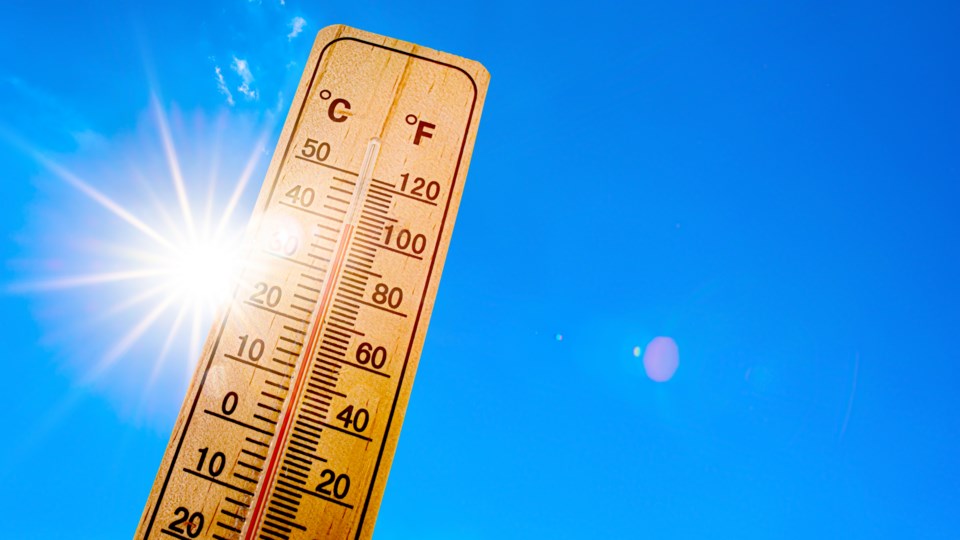The heat wave continues in Whistler, with temperatures expected to climb to 31 C on Sunday and a scorching 34 C on Monday and Tuesday.
According to Environment Canada, a heat warning is in effect for the region.
"Heat affects everyone, but the risks are greater for: seniors, people who live alone, people with pre-existing health conditions such as diabetes, heart disease or respiratory disease, people with mental illness such as schizophrenia, depression, or anxiety, people with substance use disorders, people with limited mobility," it reads.
"Check on family, friends and neighbours, who are at higher risk, particularly if they live alone, to make sure they have a cool space. Watch for the effects of heat illness: heavy sweating, rash, cramps, fainting, high body temperature and the worsening of some health conditions. Never leave susceptible people, particularly children, or pets inside a parked vehicle. If you are in an overheated area, seek a cool place such as a tree-shaded area, splash pad, misting station, or air-conditioned spot like a public building."
If you're in Whistler and need to escape the heat, you can head to the Whistler Public Library or the Meadow Park Sports Centre. Read more here.
According to Vancouver Coastal Health (VCH), those most impacted by the heat include: seniors aged 65 years or older; people who live alone; people with pre-existing health conditions such as diabetes, heart disease or respiratory disease; people with mental illness such as schizophrenia, depression, or anxiety; people with substance use disorders; people who are marginally housed; people who are pregnant; infants and young children; people with limited mobility or other disabilities.
VCH encourages the public to check on people with known vulnerabilities to heat-related illness.
The BC Centre of Disease Control also provides heat-related guidance on its website, including info on the different types of heat alerts, how to prepare for hot temperatures, symptoms of heat-related illnesses, those most at risk during hot weather and ways to stay cool.
Visit vch.ca/heat for more info about the health impacts of heat, and tips and resources to help stay safe and cool.
Preparing for and responding to hot weather:
· If you have air conditioning at home, make sure it is in good working order.
· If you do not have air conditioning at home:
· Find somewhere you can cool off on hot days. Consider places in your community to spend time indoors such as libraries, community centres, movie theatres or malls. Also, as temperatures may be hotter inside than outside, consider outdoor spaces with lots of shade and running water.
· During daytime: Shut windows and close curtains and blinds during the heat of the day to block the sun and prevent hotter outdoor air from coming inside.
· At night: Open doors and windows when it is cooler outside to move that cooler air indoors.
· Do not rely on fans as your primary means of cooling. Fans can be used to draw cooler late-evening, overnight and early-morning air indoors.
· Keep track of temperatures in your home using a thermostat or thermometer. Sustained indoor temperatures over 31°C can be dangerous for people who are susceptible to heat.
· If your home gets very hot, consider staying with a friend or relative who has air conditioning if possible.
· Identify people who may be at high risk for heat-related illness. If possible, help them prepare for heat and plan to check in on them.
Your health:
· Drink plenty of water and other non-alcoholic liquids to stay hydrated, even if you are not thirsty.
· Alcohol worsens heat intolerance, and increases chances of dehydration.
· Spray your body with water, wear a damp shirt, take a cool shower or bath or sit with part of your body in water to cool down.
· Take it easy, especially during the hottest hours of the day.
· Stay in the shade and use a broad-spectrum sunscreen with SPF 30 or more.
· Take immediate action to cool down if you are overheating. Signs of overheating include feeling unwell, headache and dizziness. Overheating can lead to heat exhaustion and heat stroke.
· Signs of heat exhaustion include heavy sweating, severe headache, muscle cramps, extreme thirst and dark urine. If you are experiencing these symptoms, you should seek a cooler environment, drink plenty of water, rest and use water to cool your body.
· Signs of heat stroke include loss of consciousness, disorientation, confusion, severe nausea or vomiting and very dark urine or no urine. Heat stroke is a medical emergency. Call 911 or your local emergency number if you are caring for someone who displays symptoms of heat stroke, then take immediate action to cool them down while waiting for help to arrive.
If you have a less urgent health issue:
· You can call HealthLinkBC at 811 and speak with a nurse, connect with your family physician if you have one, or go to an urgent care centre or clinic if you can do so safely. That way, our emergency medical dispatch staff and paramedics will be available for people who need their services the most.
· There are also online tools at healthlinkbc.ca, including a “Check Your Symptoms” tool.




